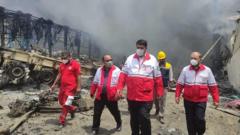In Iran, feelings of deep sorrow are escalating into public outrage after a catastrophic explosion at Shahid Rajaee, the country's largest commercial port, resulted in the deaths of at least 40 individuals and injuries to over 1,000 more. The disaster, which struck on Saturday morning, has prompted citizens from various regions to flock to hospitals to donate blood in support of the affected.
As smoke continues to billow over the site, the Iranian health ministry has issued warnings advising residents of nearby towns to stay indoors due to potential exposure to toxic chemicals. Consequently, the cities, including Bandar Abbas, where military installations are located, have seen schools and offices closed to maintain focus on emergency response measures.
Ceremonies meant to celebrate local festivals turned somber, transforming into memorials for the deceased and prayers for the wounded. In light of the tragedy, Iranian authorities have declared Monday a national day of mourning, with additional days set aside in Hormozgan province.
Amidst lamentations, a growing scrutiny surrounding the explosion has surfaced, sparking a blame game. Reports from Ambrey Intelligence, a maritime risk consultancy, suggest that the explosion was a result of mishandling solid fuel intended for missiles, indicating a potential safety lapse. It is alleged that containers filled with sodium perchlorate, a key ingredient for missile fuel, may have been improperly stored, fostering public skepticism regarding the actions of military and governmental organizations.
With the Iranian regime facing scrutiny, President Masoud Pezeshkian has engaged directly with the disaster site and ordered an investigation to ascertain the cause. Official statements denied the importation of military cargo in the vicinity, asserting the explosion stemmed from a fire at a chemicals storage depot. Nevertheless, citizens are questioning the wisdom and care of leaving flammable materials at the port.
The economic ramifications could also be significant, as the port is vital to Iran’s import activities, handling 80% of incoming goods. Initially, warnings of potential food shortages emerged; however, officials later tempered these fears, suggesting only a section of the port was affected.
International assistance and condolences have poured in, with various nations, including Russia and China, offering support in firefighting efforts and expressing sympathy for the victims. As the disaster occurred amid U.S.-Iran negotiations concerning Tehran's nuclear program, it remains unclear how this incident may shape future diplomatic developments.
As investigations unfold, Iranians continue to grapple with both the immediate aftermath of the explosion and the implications of accountability and safety within their nation’s operational framework.

















